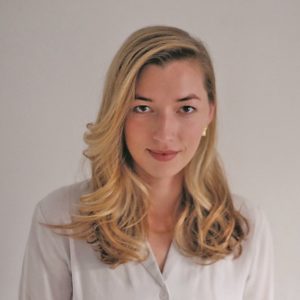Hannah Perrin King entered college with a foolproof plan: complete pre-med coursework, major in English, and become a doctor who writes prose in her spare time. But thanks to a scheduling error, King landed in a poetry workshop instead of the fiction class she had enrolled in one semester.

“I fell in love with it,” she says. “The rest is history.”
The current Fine Arts Work Center fellow writes with a scientist’s attention to the drama of the natural world and to the permeable, reciprocal boundary between its human and animal occupants. Her poems call upon “saltwater cowboys”; identify an Oldsmobile by its “smirk, baboon-like”; and describe traumatic histories that get buried “like deer blood, the knots of intestines cooled in the earth, so as not to draw predators.”
Growing up in the Sierra Nevada foothills, King began riding horses at age four. She competed in dressage — a relatively staid equestrian pursuit — but still broke her nose riding bareback in the woods at 14. Horses frequently appear in her work.
“In negotiating material that has to do with parents or childhood or trauma, there’s always horses underpinning all those narratives, quite literally,” she says. She adds that horses are also a cultural symbol that “can be so many things in different poems or the same poem” — at once majestic and practical, omnipresent and overlooked.
King graduated from Brandeis University in 2015 and completed her M.F.A. at the New School in 2018. Her current project incorporates blocks of prose alongside poetry, and prose writers are some of her greatest influences. King says that Jamaica Kincaid’s Autobiography of My Mother, for instance, showed her that a book doesn’t need to unfold “in a trustworthy way. It can be sort of falling apart, in a sense, narratively.”
Maybe this is a useful working definition of poetry: something that is “constantly coming undone at the seams,” King muses. “And if you can keep it in that middle spot of not falling apart as it’s falling apart, that’s an interesting place to write from.”
King’s poems throb with a feeling of place, both explicit and imagined. “I always think of poetry as vertical, and fiction is horizontal,” she says. “When you have that sort of pressure, that lack of surface area, you’re doing so much in such a little space, those moments of place or groundedness can be really vital in bringing the reader along with you in whatever weird thing you’re trying to do.”
Her time on the watery Outer Cape has sparked what might be an entire manuscript about the landscapes and ecologies she’s encountered. “What a weird and magical place, this narrow little spiral of sand out in the ocean,” she says. Since October, she’s been going out each day to take photos and make sketches of her surroundings.
A self-professed “left-brained” thinker, King uses different media for methodical re-renderings within her own head. If writing from scratch teases out a murky mental image, these more concrete visual practices produce immediately legible ideas. Writing from such inspiration in turn “is the secondary translation of whatever image I’m trying to portray,” she says. “But it’s easy to want to be outside here all the time, just messing around and taking photos.”
King says that one of the greatest gifts of the FAWC fellowship is its mix of artists and writers, which she says “counters the myopia” of the claustrophobic art and writing worlds. “We’re doing our work so differently,” she says, “and yet there’s an obsession with description, whether it’s an image or a piece of writing.” Visual artists, she adds, have “such good words that are so ripe for the stealing.” (“Fugitive colors,” a phrase describing colors that fade from a painting as it ages, has stuck with her.)
King has found herself unexpectedly hypnotized by Provincetown’s seagulls and can’t stop writing poems about them. “Like, why not something cute like a starling?” she asks. “But no. Gulls.”
When her fellowship ends in April, King will return to Great Barrington, where she recently moved with her partner after years in New York City. For now, King says she feels settled in the fellowship’s rhythms and is ready for what she calls “the core of the work.”
“It’s weird and cold, and everyone has their head down,” she says. Inspired by John McPhee’s New Yorker essay “Structure,” she’s set up a makeshift table with a plank of particle board held up by sawhorses on which to map out her manuscript. It’s not precious, and the project is coming together there.
King is still weighing a career in medicine but maintains that the divide between the scientific and literary arts is not as wide as we make it out to be: “There’s a lot more overlap than Western academia admits.” Even the process of writing shares a fundamental curiosity with a scientist’s work in the lab.
In the long run, King says she’d like to actualize her dream of pursuing both passions: “I don’t feel like one is enough.”
